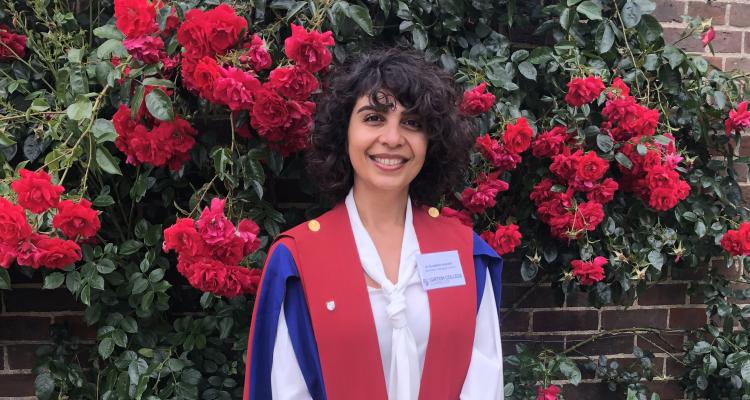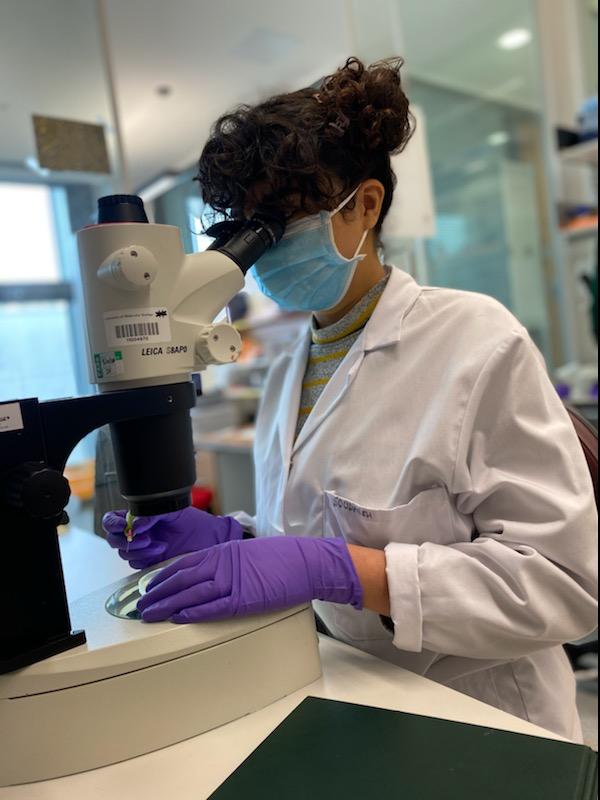We asked Dr Soudabeh Imanikia, Official Fellow in Biological Sciences, a few questions as part of International Day of Women and Girls in Science 2024.
Feature
#WomenInScience Profiles: Dr Soudabeh Imanikia

What could the science community do to ensure a greater inclusion of women and girls in science?
I’d like to add a twist on this question: What could the science community do to sustain a greater inclusion of women and girls in science post higher education? It’s been years that increasing numbers of women and girls continue their education, often more than their male counterparts, and subsequently stay in science and research. However, at a certain age or a certain turning point, many are either deselected or they have to choose an alternative path. Therefore, we may need to rethink how to accommodate a young mother or a woman who simply wants a healthier work-life balance to stay in STEM topics. We, as a society have come a long way in the West, but is this reflected across different areas of the society? Cambridge in particular is a living-breathing example of this phenomenon: Many women and girls in science and adjacent fields, yet the top tiers of academia and research retain a rather male phenotype. I have chosen the word phenotype with care, as many women who, against all odds, manage to climb to these heights can only do so by denying or compromising their femininity. As such, to me, several gaps remain to be addressed. Providing an accommodating environment for all genders that is not specifically catering for only half of the society would be a great place to start. This can be achieved by asking a simple question and listening to the answers. What makes you leave? I am sure that the answers will reveal a pattern.
Sum up the importance of women and girls in science and what would you say to encourage them to enter STEM careers
Dream big! That’s my number one motto! Having women and girls in science and nurturing the minds of the younger generation simply will result in more diversity of ideas, flourishing curiosity and healthy competition. STEM careers can be daunting, long, and irregular hours can be off putting. But speaking up, showing eagerness, and suggesting what adjustments are needed can be a first step that every female in STEM may need to do. I always wonder, have we asked for what we need? Or is this just a learnt assumption? Challenge the norm and be assured that at some point, what may have been beyond reach may be the “new normal”! Change is always painful, like teething, but the outcome can not only benefit us but also the future generations. Look at what we as women have achieved in the last 100 years; nothing seems impossible to me at this point!
Another key aspect is that the nature of STEM topics in itself also provides woman and girls with an excellent playing field for building confidence and resilience, a quality that can be stretched outside of careers and provide the society with more confident and flexible counterparts.
How does Girton encourage women and girls to enter STEM careers?
Girton is a beautiful example of empowering women. We have a female leader, who is competent and yet extremely down to earth. We have several fantastic fellows in key STEM topics and we work together to raise the next generation of scientists, researchers, and STEM enthusiasts! Girton is a unique environment that has always been an advocate of women and girls. It is a safe haven for cultivating and preparing young minds for STEM careers. There are multiple inspiring female speakers, honorary fellows and educators who inspire students to keep pursuing STEM careers.
What inspired you to pursue your research?
I had 3 motifs: an amazing grandfather who was always talking to me about how crucial it is for a woman to study and to be independent; a wonderful mother who has always been my number one supporter and motivator for following my dreams. And lastly, “Dolly the Sheep!” Dolly was the first mammal cloned from an adult somatic cell. I was fascinated by the news about Dolly in 1996 and fell in love with the field of genetics at a very young age! That’s how I ended up becoming a geneticist, even though my research topic was primarily on metabolism and ageing.
Tell us about your research - what are the challenges, and what is the impact of the work?
I spent 7 years of my postdoctoral research at the MRC Laboratory of Molecular Biology (MRC LMB) purely working on lipid metabolism and protein homeostasis in the concept of longevity. Working in a newly established lab, I had to build a strong network of collaborations to be able to conduct my research. I developed an extraordinary degree of resilience and had to adapt to change. Despite countless failed experiments, I continued to pursue my goals and I published in high impact peer-reviewed journals. However, I reached a point where I struggled to “push further”. Research alone was not satisfying my thirst for making an impact in the world and on humanity. I had to find my calling and made the brave decision to hang up my lab coat and to seek out a STEM career where the goals resonated with me more.
As a result, I joined AstraZeneca 2 years ago to pursue a career in Oncology R&D in Precision Medicine. While this meant I was leaving behind primary research, I remain engaged in science and specifically work on diagnostics and biomarker testing in different cancers.
Additionally, through the fantastic opportunity offered to me by Girton College, I found a fulfilling role as a Fellow and Tutor, in which I hope to inspire young minds and in particular to show young girls and women of Girton College that if you dream it, you make it!
I have reached a stage where I feel what I do in Oncology indeed matters, and what I teach in college may inspire some of the students to continue their path to STEM careers.
Further to this, I consciously make efforts to reach beyond the “Cambridge-bubble” and volunteer frequently as a registered STEM Ambassador (East of England Hub). Therefore, either through work or independently, I deliver STEM talks, partake in Big Biology Days and Science Week to promote more inclusion in STEM topics. Hopefully, I get to play even a very small role in inspiring other girls and women who might embark on a similar path to me, or to forge their own.
My advice to them: Go forth, be brave, be awesome!
You can follow Soudabeh on following platforms:
- X/Twitter: @Genes_GigglesDr
- Facebook: @soudi86
- Instagram: @dr_genes_giggles

